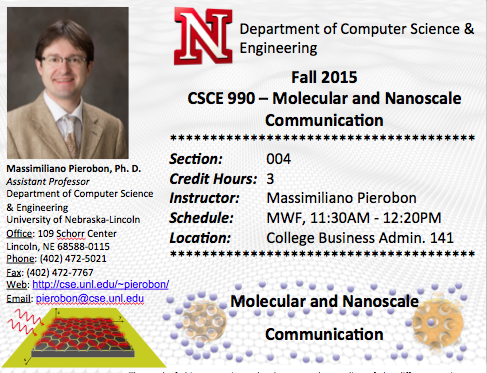
Looking to add a class to your schedule? Check out CSCE 990 and CSCE 496/896. Both courses still have openings.
CSCE 990: Molecular and Nanoscale Communication
The goal of this course is to develop an understanding of the different options to realize communication at the nanoscale among nano-precise entities, or nanomachines, being them genetically engineered biological cells or man-made nanodevices. The specific focus will be on bio-inspired communication through molecule exchange, called Molecular Communication, and electromagnetic THz communication. Different techniques to study the transmission of information through nanoscale channels, model the noise sources, and understand the limits of these systems will be surveyed in this course. The students will be also initiated to advanced applications in the field of intra-body networking and intelligent drug delivery.
Good standing graduate students from Computer Science and Engineering, Electrical Engineering, Chemical Engineering, Biology, Chemistry, Chemical and Biomolecular Engineering, and Mathematics are welcome to attend this course. Most of the necessary concepts from physics, chemistry, and biology, as well as from systems and communication engineering, will be provided during the lectures to accommodate students with different backgrounds, and let them benefit from a truly interdisciplinary approach. Student creativity, passion, and open-minded attitude will be highly appreciated and rewarded.
The Molecular and Nanoscale Communication course will also include semester-long projects, both theoretical and practical. This class will give a chance to be initiated to a very exciting cutting-edge research field, which will soon influence many diverse research fields, such as engineering, chemistry, biology, and medicine.
This course is offered MWF from 11:30 a.m. - 12:20 p.m. in CBA 141. The section is 004.
CSCE: 496/896 Genetically Engineered Systems
The goal of this course is to introduce Computer Science (and Electrical Engineering/Math) students to the emerging field of synthetic biology, and its interdisciplinary foundational concepts. This course will present the technologies at the basis of synthetic biology, together with the engineering concepts that underlie the design, modeling, and realization of genetically engineered systems. The course will survey examples of cutting edge applications, from the production of biofuels to the design and implementation of biosensors to detect harmful agents. A special emphasis will be given to the International Genetically Engineered Machine (iGEM) competition and its latest results in terms of research and training. Ethical, legal, and societal aspects of this new interdisciplinary field will be also discussed by glancing at possible future scenarios.
Good standing undergraduate/graduate students from Computer Science and Engineering, Electrical Engineering, and Mathematics are welcome to attend this course. Most of the necessary concepts from physics, chemistry, and biology, will be provided during the lectures. Student creativity, passion, and open-minded attitude will be highly appreciated and rewarded.
The Genetically Engineered Systems course will also include semester-long projects, where students will expand their knowledge on specific selected topics in synthetic biology. This course will provide a broad overview of a fast-growing interdisciplinary field, which will be one of the main future trends not only in the academic, but also in the industrial and medical job markets.
This course is offered MWF 2:30 p.m. - 3:20 p.m. in Avery Hall 119. The section is 002.